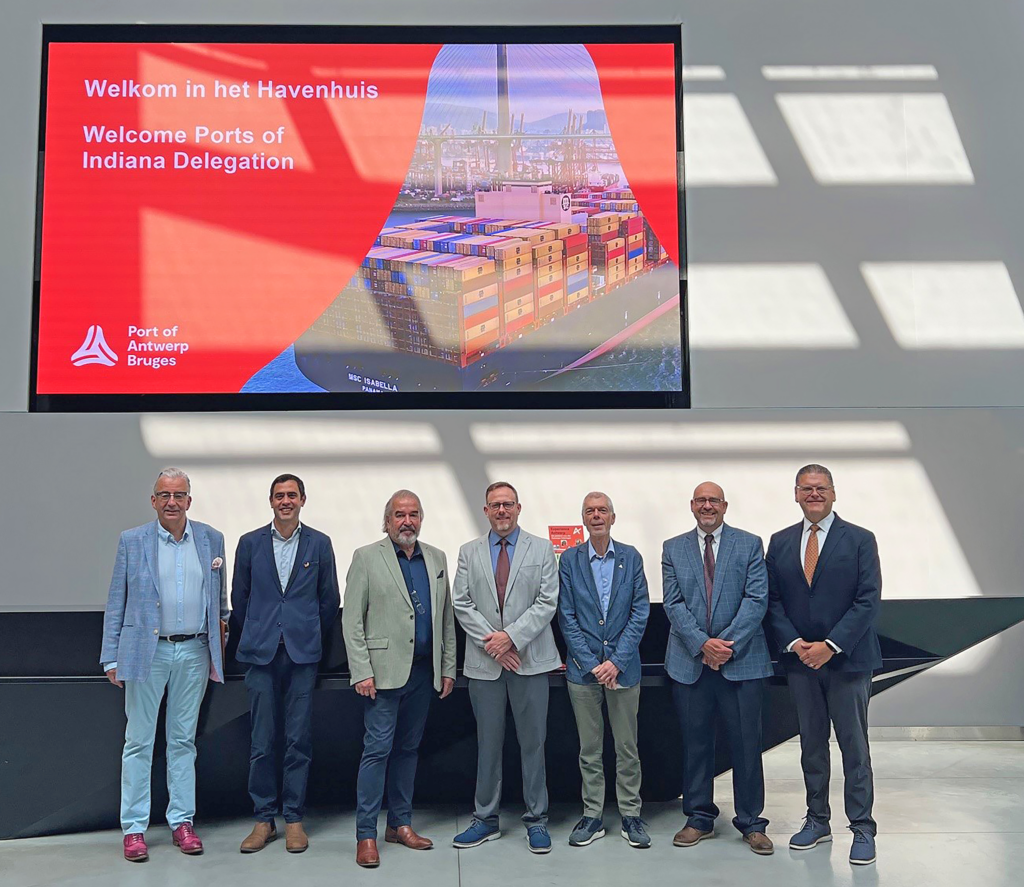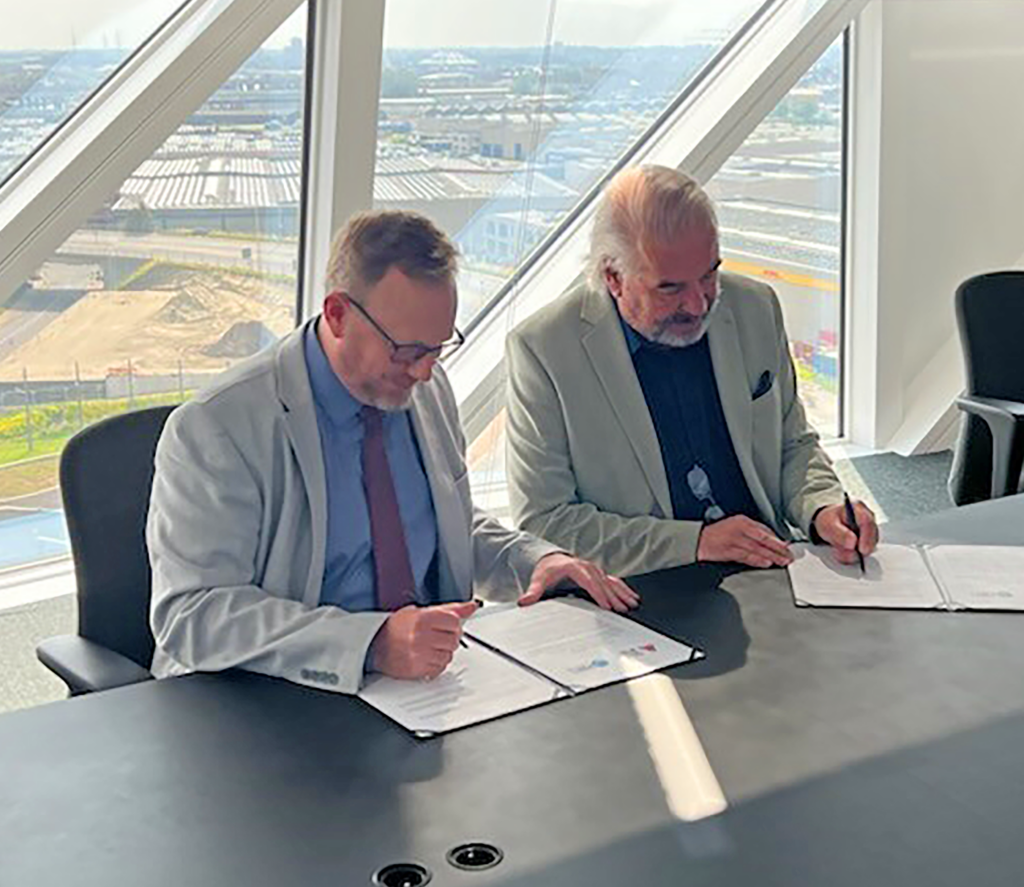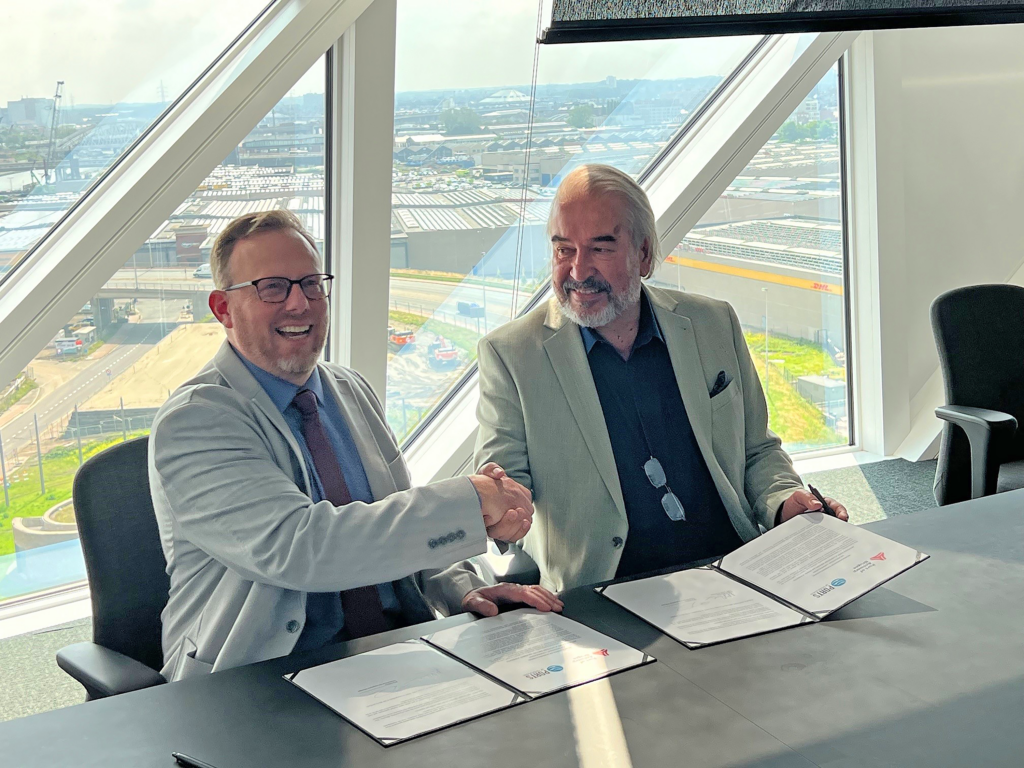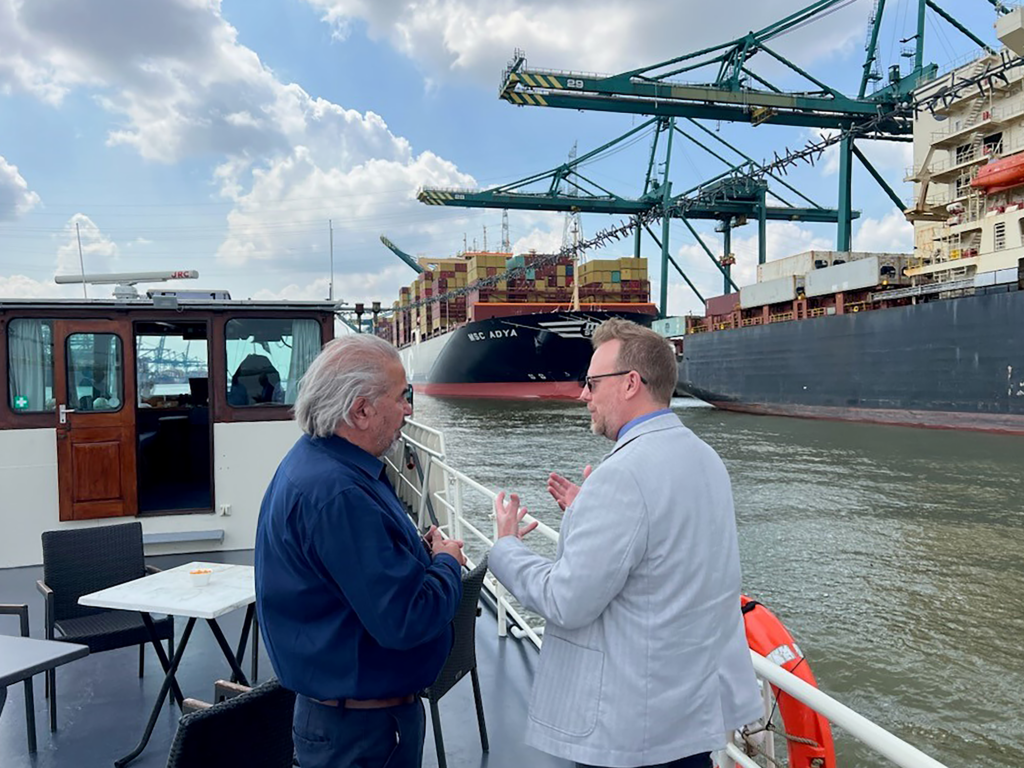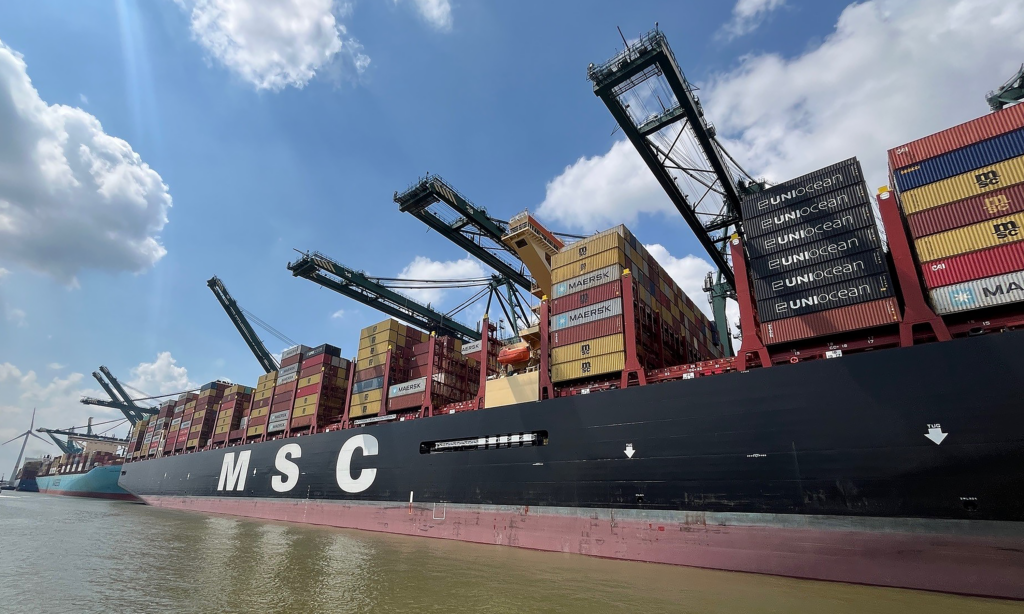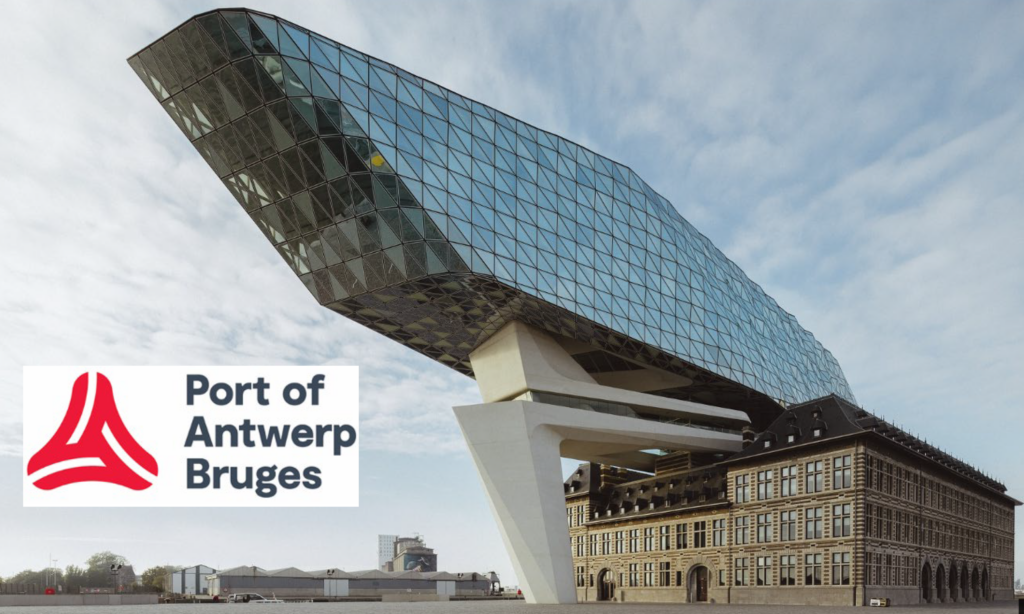Ports of Indiana, Port of Antwerp-Bruges partner to pursue economic initiatives, container trade and green shipping
- Participant in MOU signing (L-R): Luc Luwel, Chief Executive Officer, Voka Flemish Chamber of Commerce; Kristof Lowyck, Coordinator Invest Americas, Government of Flanders Investment & Trade; Wim Dillen, International Development Manager, Port of Antwerp-Bruges; Jody Peacock, CEO, Ports of Indiana; Capt. Jan Cuyt, Business Development Advisor, Maritime Business & Market Intelligence, Port of Antwerp-Bruges; Bill Kiser, Executive VP Science and Technology, Applied Research Institute of Indianapolis; David Roberts, CEO, Applied Research Institute of Indianapolis.
- Jody Peacock, CEO of Ports of Indiana (left) and Wim Dillen, International Development Manager for Port of Antwerp-Bruges, sign partnership agreement at the port office in Antwerp, Belgium.
ANTWERP, Belgium (July 17, 2024) – Representatives from Ports of Indiana and Port of Antwerp-Bruges met in Antwerp today to sign a Memorandum of Understanding (MOU) to advance key economic and environmental port initiatives. The landmark agreement formalizes a plan to work together to advance economic development, container shipping, decarbonization, port security and technology integration.
The delegations included Jody Peacock, Chief Executive Officer for Ports of Indiana, Wim Dillen, International Development Manager for Port of Antwerp-Bruges, and representatives from Applied Research Institute of Indianapolis and Voka, the largest business network in Flanders.
“It’s an honor to partner with Europe’s second largest port. Port of Antwerp-Bruges is a true world port and a major innovator for global shipping,” Peacock said. “Our ports have mutual strategic, economic, and innovation interests, and this agreement formalizes a plan for working together to advance key shipping and port development initiatives that will support robust sustainable growth in both of our regions.”
The agreement was a result of past collaborations between the ports, a recent trade mission by Indiana Governor Eric Holcomb to Belgium in June, and an MOU between the State of Indiana and the Government of Flanders signed Dec. 8, 2023, in Indianapolis, that called for “cooperation and information sharing between the Ports of Indiana and the Flemish sea ports.”
“It’s exciting to launch this collaboration as Ports of Indiana is initiating new economic development and environmental programs that align with the goals and objectives of Port of Antwerp-Burges, including establishing the first all-water container shipping route between Europe, Chicago and the U.S. Midwest,” Dillen said. “Our ports, centrally located as key trade hubs, have tremendous opportunities to jointly pursue critical connections between Europe and North America.”
With more than 300 liner services and 1,200 destinations, Port of Antwerp-Bruges is the second largest port in Europe. It is an important lifeline for the Belgian economy, supporting employment for 164,000 people and generating added value of more than €21 billion annually. The port handles 290 million tons of international maritime cargo per year and is home to Europe’s largest integrated chemical cluster.
Being centrally located in the U.S., Indiana is home to the median center of the U.S. population and is a national leader in business, steelmaking and logistics. It ranks first among U.S. states in steelmaking, pass-through interstates, and various rail cargoes, and was recently ranked by Forbes as the #1 place to start a business in the U.S.
For maritime shipping, Indiana ranks 13th among the 50 U.S. states, handling 54 million tons annually on the Great Lakes and Ohio River, with international connections through the St. Lawrence Seaway to the Atlantic Ocean and the inland river system to the Gulf of Mexico. The Southern Indiana Port District ranks as the 22nd largest port in the U.S. while the Northern Indiana Port District ranks 25th. Ports of Indiana is a statewide port authority operating three ports that contribute $8.7 billion annually to Indiana’s economy.
In June, Ports of Indiana launched “The Indiana Container Initiative” to establish new container terminals at multiple locations in the state and a received approval from U.S. Customs & Border Protection to begin developing the state’s first international sea cargo container terminal at Ports of Indiana-Burns Harbor, scheduled to open in 2026. This new terminal will offer the first all-water container route between Europe and the Chicago metropolitan area, which is one of the largest container hubs in North America.
The Burns Harbor port operates on 600 acres within sight of downtown Chicago and has 75 acres available for container operations with specialized Foreign-Trade Zone, logistics, packaging and refrigerated container services. The Chicago region is a preeminent hub for intermodal freight handling 50 percent of the country’s intermodal trains, $3 trillion in goods and 16 million TEUs annually, more than double any U.S. seaport.
Through the new MOU, the ports will explore the opportunity to develop container trade to support key industries, including advanced manufacturing, semiconductors, microelectronics, clean energy, life sciences, agriculture, hardwoods, steel, and soybean production. The collaboration also reinforces Ports of Indiana’s commitment to the Great Lakes St. Lawrence Regional Maritime Strategy which prioritizes growing trade with Antwerp for steel, grain, and breakbulk cargoes.
Lastly, the MOU is also intended to strengthen each of the participants’ commitments to decarbonization initiatives by sharing best practices and exploring the development of a “Green Shipping Route” from Belgium to Indiana that could significantly reduce carbon emissions versus traditional supply chain routings.
About Port of Antwerp-Bruges: Port of Antwerp-Bruges consists of port sites at Antwerp and Zeebrugge and is operated by the Antwerp-Bruges Port Authority. The port is a critical hub in worldwide trade with an overall throughput of 290 million tons annually and link for handling containers, breakbulk and vehicles. The port is home to 1,400 companies and supports 164,000 jobs, generating an economic impact of €21 billion each year. Web: www.portofantwerpbruges.com
About Ports of Indiana: Ports of Indiana is a statewide port authority operating three ports on the Ohio River and Lake Michigan. Established in 1961, Ports of Indiana is a self-funded enterprise dedicated to growing Indiana’s economy by developing and maintaining a world-class port system, and by serving as a statewide resource for maritime issues, international trade, and multimodal logistics. Web: www.portsofindiana.com; Container Initiative: www.portsofindiana.com/containers
Media Contact: Eric Powell, +1 (317) 233-6231 or e-mail
- Jody Peacock, CEO for Ports of Indiana (left), and Wim Dillen, International Development Manager for Port of Antwerp-Bruges.
- Wim Dillen, of Port of Antwerp-Bruges (left) and Jody Peacock with Ports of Indiana discuss development opportunities during a harbor cruise at Port of Antwerp-Bruges.
- Port of Antwerp-Bruges handles 24,000 TEU container vessels and ranks as the 12th largest container port in world and 2nd largest in Europe.
- Port of Antwerp-Bruges office hosted the signing of a new MOU with Ports of Indiana.


